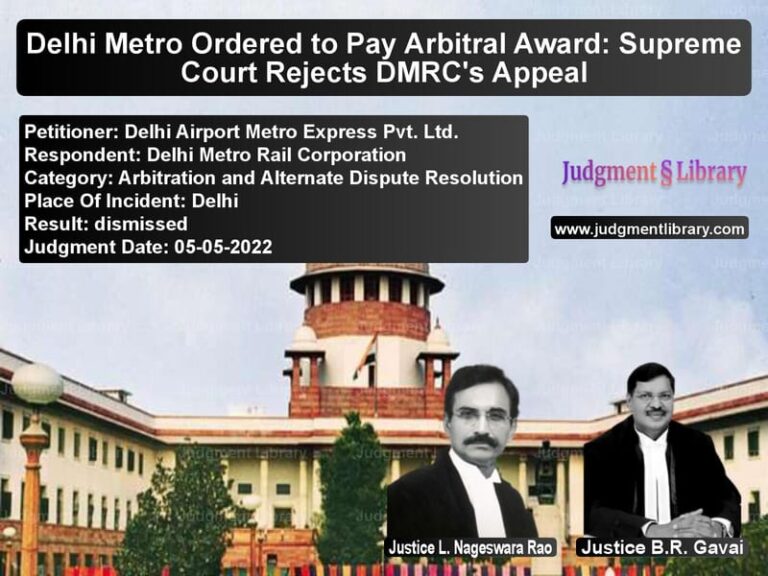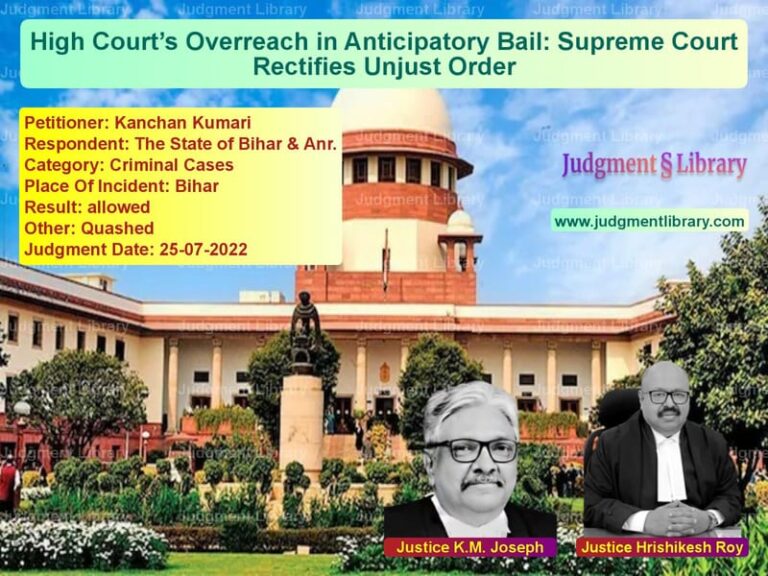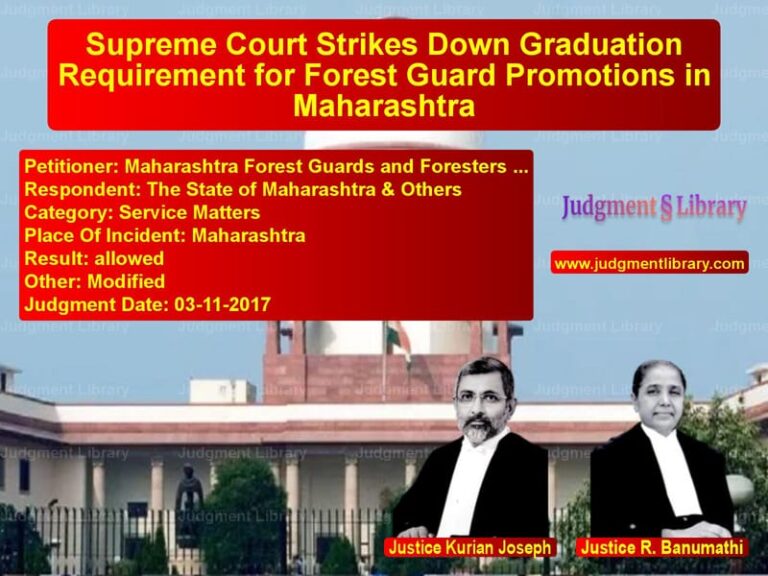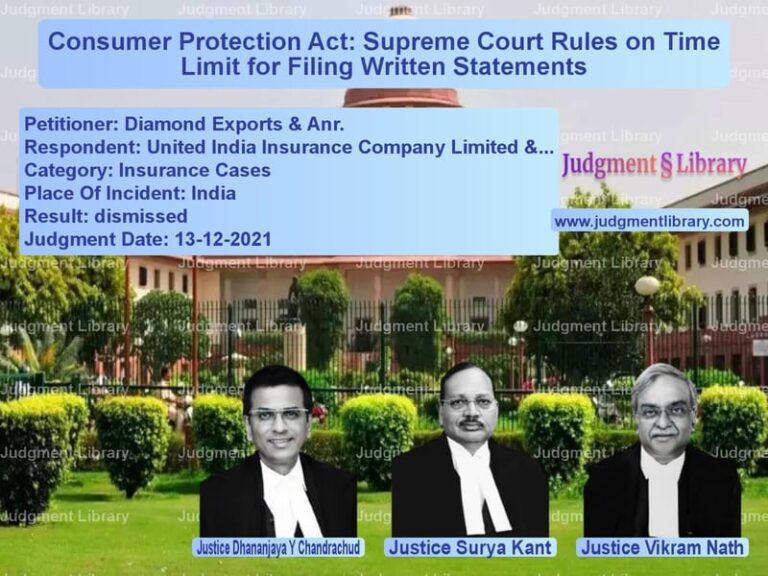Visvesvaraya Technological University vs. Income Tax Department: Supreme Court Denies Tax Exemption
The Supreme Court of India delivered a landmark judgment on April 22, 2016, in the case of Visvesvaraya Technological University (VTU) vs. Assistant Commissioner of Income Tax. The ruling centered around the interpretation of Section 10(23C)(iiiab) of the Income Tax Act, 1961, and whether VTU qualified for a tax exemption as an educational institution wholly or substantially financed by the government.
The judgment dismissed VTU’s appeal, holding that the university did not meet the criteria for tax exemption since its funding from the government was minimal, and it had accumulated substantial surpluses over the years. This decision clarified the scope of tax exemptions for educational institutions and set a significant precedent for similar cases.
Background of the Case
Visvesvaraya Technological University (VTU) was established under the Visveswaraiah Technological University Act, 1994, and serves as the governing body for technical education in Karnataka. It oversees all government and private engineering colleges in the state.
For the assessment years 2004-2005 to 2009-2010, VTU filed income tax returns declaring ‘Nil’ income and claimed tax exemption under Section 10(23C)(iiiab) of the Income Tax Act, asserting that it was an educational institution that was not-for-profit and was substantially financed by the government. However, the Income Tax Department rejected this claim, leading to legal proceedings.
Legal Framework for Tax Exemption
Section 10(23C)(iiiab) of the Income Tax Act provides an exemption from taxation for the income of a university or other educational institution if it fulfills the following conditions:
- It must exist solely for educational purposes and not for profit.
- It must be wholly or substantially financed by the government.
The central issue before the court was whether VTU met these conditions.
Petitioner’s Arguments
The counsel for VTU argued the following points:
- Primary Function of Education: VTU was solely dedicated to education, and any surplus generated was reinvested in infrastructure and educational programs.
- Statutory Fee Collection: The fees collected from students were legally mandated under the VTU Act and should be considered as funds received under government authorization.
- Government Financing: The university had received grants, land allocations, and subsidies from the government, which should be counted as substantial financing.
- Judicial Precedents: The university relied on past cases, such as Islamic Academy of Education v. State of Karnataka, where the court held that reasonable surpluses reinvested in education do not indicate a profit motive.
- Misinterpretation by Tax Authorities: VTU contended that the High Court and lower tax authorities had taken an unduly strict view of ‘substantial financing’ and ignored the broader contributions made by the government.
Respondent’s Arguments
The Income Tax Department countered these claims, arguing:
- Significant Surplus Generation: VTU had accumulated over Rs. 500 crore in surplus from 1999 to 2010, showing that it was generating significant profits.
- Minimal Government Grants: Government funding accounted for less than 1% of VTU’s total receipts, far from qualifying as ‘wholly or substantially financed.’
- Misuse of Tax Exemption: The exemption under Section 10(23C)(iiiab) was meant for institutions heavily reliant on government funds, which was not the case for VTU.
- Fee Collection Not Equivalent to Government Financing: Statutory fee collection, even if mandated by law, was not direct government funding and could not be classified as such.
Supreme Court’s Observations
The Supreme Court analyzed past judgments, including Queen’s Educational Society v. Commissioner of Income Tax and Islamic Academy of Education v. State of Karnataka, and set out key principles regarding tax exemptions for educational institutions:
- Generating a surplus does not automatically disqualify an institution from tax exemption if the surplus is reinvested in education.
- Substantial financing must come directly from government funds, not just through statutory fee collection.
- Institutions receiving minimal government grants cannot claim exemption under Section 10(23C)(iiiab).
The court noted that VTU’s government funding, even when accounting for land allocations, was minimal. The university had grown and expanded its infrastructure using its own surplus funds rather than relying on government aid.
Supreme Court’s Ruling
The court ruled against VTU, stating:
“The appellant University does not satisfy the second requirement spelt out by Section 10(23C)(iiiab) of the Act. The appellant University is neither directly nor even substantially financed by the Government so as to be entitled to exemption from payment of tax under the Act.”
The Supreme Court upheld the findings of the High Court and tax authorities, emphasizing that tax exemptions must be granted strictly based on statutory requirements.
Implications of the Judgment
This ruling has significant implications for educational institutions seeking tax exemptions under Section 10(23C)(iiiab):
- Institutions must demonstrate substantial direct government funding to qualify for exemption.
- Statutory fee collection alone does not equate to government financing.
- Surplus funds must be carefully evaluated to determine whether they indicate a profit motive.
- This decision establishes a clear precedent for tax authorities to assess exemptions based on direct government contributions.
Conclusion
The Supreme Court’s judgment in Visvesvaraya Technological University vs. Income Tax Department reaffirmed that tax exemptions for educational institutions must be strictly evaluated based on direct government funding. VTU’s claim was rejected because it failed to demonstrate substantial government financing, highlighting the necessity for universities and educational institutions to maintain clear records of funding sources when seeking tax relief.
Don’t miss out on the full details! Download the complete judgment in PDF format below and gain valuable insights instantly!
Download Judgment: Visvesvaraya Technol vs Assistant Commission Supreme Court of India Judgment Dated 22-04-2016-1741854654156.pdf
Direct Downlaod Judgment: Direct downlaod this Judgment
See all petitions in Income Tax Disputes
See all petitions in Tax Evasion Cases
See all petitions in Tax Refund Disputes
See all petitions in Judgment by Ranjan Gogoi
See all petitions in Judgment by Prafulla C. Pant
See all petitions in dismissed
See all petitions in supreme court of India judgments April 2016
See all petitions in 2016 judgments
See all posts in Taxation and Financial Cases Category
See all allowed petitions in Taxation and Financial Cases Category
See all Dismissed petitions in Taxation and Financial Cases Category
See all partially allowed petitions in Taxation and Financial Cases Category







